|
|
|
Sort Order |
|
|
|
Items / Page
|
|
|
|
|
|
|
| Srl | Item |
| 1 |
ID:
131565
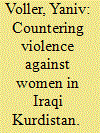

|
|
|
|
|
| Publication |
2014.
|
| Summary/Abstract |
The struggle against gender-based violence in the Iraqi Kurdistan Region has witnessed some significant achievements since the late 1990s. A subject long excluded from public discourse in the region, it has now moved increasingly into the mainstream, compelling the Kurdistan Regional Government (KRG) to take legal and practical measures against such practices as honor killings, female genital mutilation, and domestic violence. This article traces the sources of these shifts in the KRG's stance, looking especially at the role of transnational women's rights networks in the region. It highlights these networks' successful strategy of binding their cause to the KRG's endeavor to legitimize and consolidate its contested sovereignty over the Kurdistan Region. In doing so, the paper addresses an underexplored subject in the literature on women's rights campaigns in the Kurdistan Region and contributes to the study of transnational advocacy as a source of normative change.
|
|
|
|
|
|
|
|
|
|
|
|
|
|
|
|
| 2 |
ID:
131456
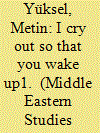

|
|
|
|
|
| Publication |
2014.
|
| Summary/Abstract |
This study focuses on the poetry of the well-known Kurdish poet Cegerxwîn (1903-84). Contextualizing Cegerxwîn's life and literary career within his specific social, political and historical circumstances, this article demonstrates the way in which Kurdish classical poetry during his madrasa education shaped Cegerxwîn's poetic creation. Furthermore, the oppression and exploitation of Kurdish peasants at the hands of tribal chiefs, sheikhs and nation-states contributed to Cegerxwîn's adoption of a Marxist and nationalist social and political standpoint. This article, attempting a closer reading of his poetry, suggests that at the essence of his poetry is found the continued use of the metaphor of awakening. Hence Cegerxwîn's poetics and politics can best be depicted as one of awakening the oppressed and subordinate social groups including the Kurds, peasants and workers from their deep sleep of oppression and exploitation. Through his Kurdish poetics and politics of awakening, it is argued, Cegerxwîn participates in the progressive political discourses of his times.
|
|
|
|
|
|
|
|
|
|
|
|
|
|
|
|
| 3 |
ID:
131457


|
|
|
|
|
| Publication |
2014.
|
| Summary/Abstract |
This research examines the role of the Lebanese Armenian diaspora (LAD) during the unstructured conflict that was the second Lebanese civil war, which extended from 1975 until 1990. This research has two aims. The normative aim is to find patterns of diasporic activity in conflict such as to support positive activities and discourage negative activities. A second is to focus on an empirical case study of the LAD in order to demonstrate that the diaspora encouraged peace-making initiatives and discouraged peace-wrecking. Importantly, the LAD as a political actor in Lebanese society played a positive role in promoting dialogue, cooperation, conflict resolution and reconciliation and had a significant impact on politics in general and conflict behaviour in particular. This study concludes that it is worth studying diaspora behaviour in conflict because a diaspora could be a powerful actor in conflict resolution and peace-making.
|
|
|
|
|
|
|
|
|
|
|
|
|
|
|
|
| 4 |
ID:
133821
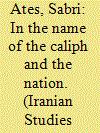

|
|
|
|
|
| Publication |
2014.
|
| Summary/Abstract |
Under the leadership of Sheikh Ubeidullah of Nehri, in the last months of 1880 tens of thousands of Iranian and Ottoman Kurds marched on northwestern Iran and temporarily took control of several cities. This movement, coupled with the response of the Iranian army, resulted in great violence and displacement. Despite its failure, in the limited literature on Kurds this revolt is seen as the birth of Kurdish nationalism. Using extensive and underutilized historical documents-including official correspondence from Iranian and Ottoman authorities as well as British consuls, and day-to-day reports and memoirs from American missionaries active in the region-this project suggests that Sultan Abdulhamid's (Sunni) pan-Islamist agenda, Shi'i-Sunni tensions, the rise of Armenian nationalism, and missionary activities in the region also played significant roles in the formation of this movement.
|
|
|
|
|
|
|
|
|
|
|
|
|
|
|
|
| 5 |
ID:
133824
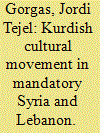

|
|
|
|
|
| Publication |
2014.
|
| Summary/Abstract |
In the late nineteenth and early twentieth centuries diverse, and sometimes competing, movements of cultural renaissance emerged in the Middle East. Within this context, the Kurdish cultural renaissance in the Kurmanji dialect appeared relatively late and moreover its fruits were curtailed by two major events: the First World War and the establishment of the Turkish republic. From 1923 onwards, the task of animating the Kurdish cultural renaissance fell on the Kurds exiled first in mandatory Syria and Lebanon and then in Europe. In exile, Kurdish intellectuals benefited from some advantageous conditions such as freedom of speech and organization. Yet Kurdish intellectual endeavors in the Levant were to face political, social and economic challenges. Using French records and Kurdish newspapers, this article explores both the opportunities and the constraints for the consolidation of the Kurdish cultural renaissance under colonial rule. In doing so, the article intends to enrich the debate on the formation of nationalisms in the interwar era on the one hand, and the relationship between colonial powers and minorities in the Middle East, on the other.
|
|
|
|
|
|
|
|
|
|
|
|
|
|
|
|
| 6 |
ID:
133823
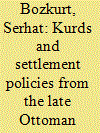

|
|
|
|
|
| Publication |
2014.
|
| Summary/Abstract |
This article highlights the continuities and discontinuities between the settlement policies of the late Ottoman state and early Republican Turkey. It argues that although there was a certain degree of evolution in the language employed by the state between the late Ottoman and Republican periods, there is a significant amount of overlap between the policies pursued by the Committee of Union and Progress which seized power in 1913 and the Kemalist regime established in the early 1920s towards the Kurds. In short, the emergence of settlement policies aimed at assimilating the Kurds into the Turkish nation are not an innovation of the Kemalists; it is possible to trace them to the late Ottoman period. This is substantiated through a comparison of two laws relating to settlement; the 1916 "Ordinance Outlining the Transfer and Settlement as well as the Sustenance and Maintenance for Refugees arriving from Conflict Zones" prepared by the Ottoman Ministry of the Interior's General Directorate for Tribes and Refugees and the Settlement Law of 1934, which was implemented in Republican Turkey and which remained on the statute books until 2006.
|
|
|
|
|
|
|
|
|
|
|
|
|
|
|
|
|
|
|
|
|